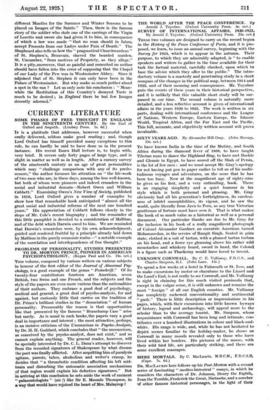CURRENT LITERATURE
SOME PHASES OF FREE THOUGHT IN ENGLAND IN THE NINETEENTH CENTURY. By the Earl of
IT is a platitude that addresses, however successful when orally delivered, seldom make good reading ; and, though
Lord Oxford has himself provided many exceptions to this rule, he can hardly be said to have done so in the present instance. His recent Essex Hall lecture is, to begin with, very brief. It covers only forty pages of large type, and is slight in matter as well as in length. After a cursory survey of the nineteenth century as an age of great personalities which may " challenge comparison with any of its prede- cessors," the author focusses his attention on " the life-work of two men who are, in these days, among the less well-known, but both of whom were pioneers and indeed crusaders in the social and industrial domain—Robert Owen and William Cebbett." Examining Owen's Nero View of Society, published in 1816, Lord Oxford gives a number of examples to show how that remarkable book anticipated " almost all the great social and industrial reforms of the next one hundred years." His appreciation of Cobbett follows closely in the steps of Mr. Cole's recent biography ; and the remainder of this little pamphlet is devoted to a consideration of Malthus, 'and of the debt which Darwin owed to him. We are reminded that Darwin's researches were, by his own acknowledgment, guided and rendered fruitful by a principle already laid down by Malthus in the purely economic realm—" a notable example of the correlation and interdependence of free thought."


































 Previous page
Previous page